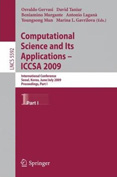De l'impact de l'attitude individuelle à l'égard de l'altérité sur la structure de l'espace résidentiel: un modèle multi-agents

|
André Ourednik, 2009, « De l'impact de l'attitude individuelle à l'égard de l'altérité sur la structure de l'espace résidentiel: un modèle multi-agents », in O. Gervasi et al. (Eds.): Computational Science and its Applications — ICCSA 2009, Part I, LNCS 5592, Berlin/Heidelberg: Springer-Verlag,pp.189-204. .download :Directly download the non-printable PDF. .buy :Buy the printable version from Springer-Verlag or access it with your acedamic subscription. .abstract : One of the main challenges of today’s analytical geography is the back-linking of observed phenomena to individual actions, as not determined by individuals’ structural situation in a one-goal society but by their very choice of spatial goals, i.e. by what shall be called individuals’ actor-dimension. In this paper we present an actor-based model of urban residential mobility. Results show that public policies in urban development must take into account and act on this actor-dimension if they are not to obtain effects opposite to their aims. .keywords : Actor-based modeling - urban development - residential space - theory of action > see model documentation and download [Java stand-alone application] |